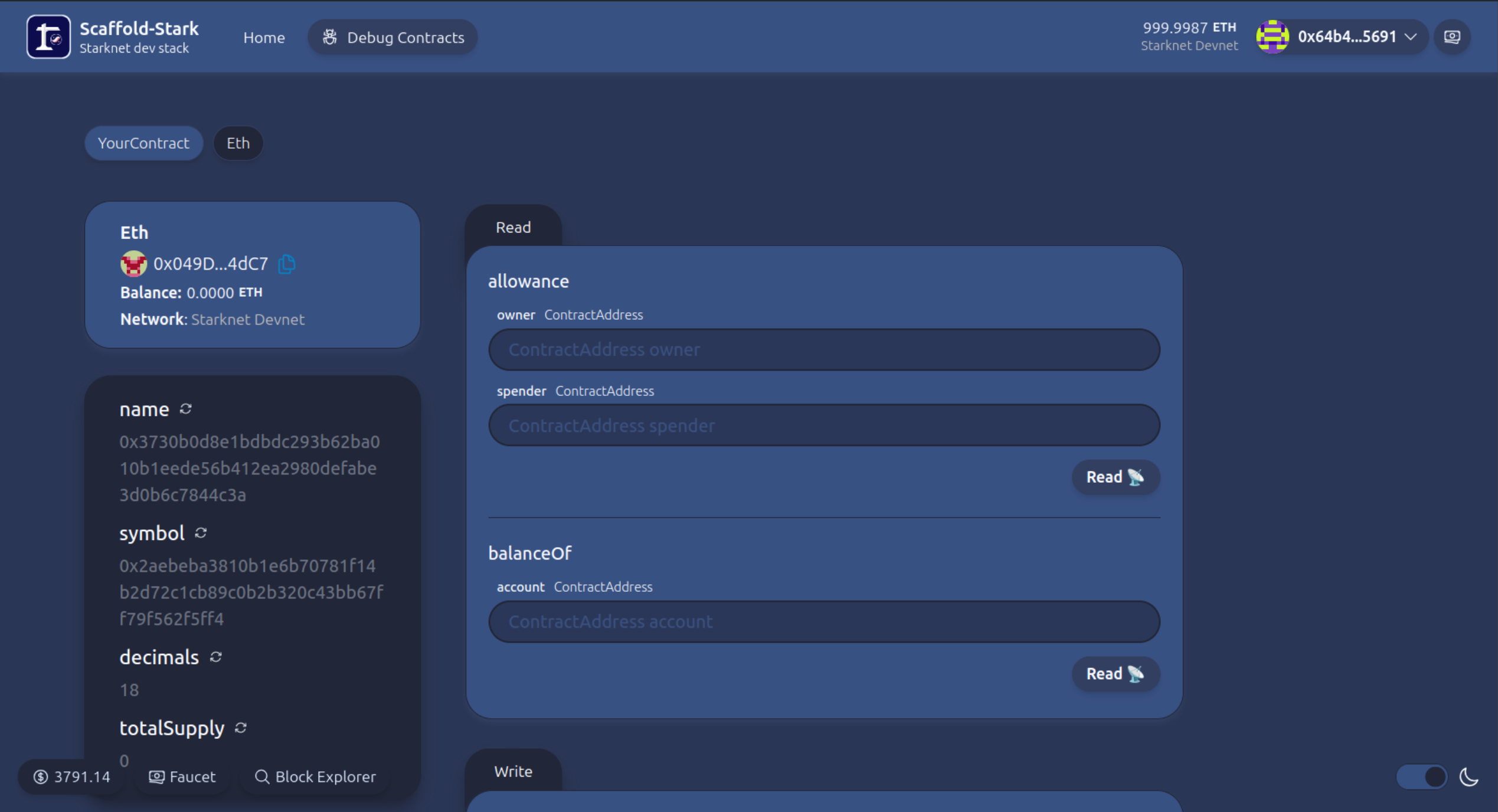🧪 An open-source, up-to-date toolkit for building decentralized applications (dapps) on Starknet blockchain. It's designed to make it easier for developers to create and deploy smart contracts and build user interfaces that interact with those contracts.
⚙️ Built using NextJS, Starknet.js, Scarb, Starknet-React, Starknet Foundry and Typescript.
- ✅ Contract Fast Reload: Your frontend auto-adapts to your smart contracts as you deploy them.
- 🪝 Custom hooks: Collection of React hooks wrapper around starknet-react to simplify interactions with smart contracts with typescript autocompletion.
- 🧱 Components: Collection of common web3 components to quickly build your frontend.
- 🔥 Burner Wallet & Prefunded Account: Quickly test your application with a burner wallet and prefunded accounts.
- 🔐 Integration with Wallet Providers: Connect to different wallet providers and interact with Starknet network.
Before you begin, you need to install the following tools:
- Node (>= v18.17)
- Yarn (v1 or v2+)
- Git
To ensure the proper functioning of scaffold-stark, your local Scarb version must be 2.5.4. To accomplish this, first check your local Scarb version:
scarb --versionIf your local Scarb version is not 2.5.4, you need to install it.
Scarb Installation Process
To install Scarb, please refer to the installation instructions. We strongly recommend that you install Scarb via asdf, a CLI tool that can manage multiple language runtime versions on a per-project basis. This will ensure that the version of Scarb you use to work on a project always matches the one defined in the project settings, avoiding problems related to version mismatches.
Please refer to the asdf documentation to install all prerequisites.
Once you have asdf installed locally, you can download Scarb plugin with the following command:
asdf plugin add scarbThis will allow you to download specific versions. You can choose the same version as the Dojo's Cairo version, for example, 2.5.4, with the following command:
asdf install scarb 2.5.4and set a global version:
asdf global scarb 2.5.4Otherwise, you can simply run the following command in your terminal, and follow the onscreen instructions. This
will install the version 2.5.4 of Scarb.
curl --proto '=https' --tlsv1.2 -sSf https://docs.swmansion.com/scarb/install.sh | sh -s -- -v 2.5.4To ensure the proper functioning of the tests on scaffold-stark, your Starknet Foundry version must be 0.23.0. To accomplish this, first check your Starknet Foundry version:
snforge --versionIf your Starknet Foundry version is not 0.23.0, you need to install it.
- scarb - v2.5.4
- cairo - v2.5.4
- starknet - v2.5.4
- snforge - v0.23.0 // starknet foundry
- sierra - v1.4.0
- rpc - v0.5.1
To get started with Scaffold-Stark 2, follow the steps below:
- Clone this repo and install dependencies
git clone https://github.com/Quantum3-Labs/scaffold-stark-2 --recurse-submodules
cd scaffold-stark-2
yarn install- Prepare your environment variables.
By defauly Scaffold-Stark 2 takes the first prefunded account from starknet-devnet as a deployer address, thus you can skip this step!. But if you want use the .env file anyway, you can fill the envs related to devnet with any other predeployed contract address and private key from starknet-devnet.
Note: In case you want to deploy on Sepolia, you need to fill the envs related to sepolia testnet with your own contract address and private key.
cp packages/snfoundry/.env.example packages/snfoundry/.env- Run a local network in the first terminal.
Note: You can skip this step if you want to use Sepolia Testnet.
yarn chainThis command starts a local Starknet network using Devnet. The network runs on your local machine and can be used for testing and development. You can customize the network configuration in scaffold.config.ts for your nextjs app.
Note: If you are on sepolia or mainnet, for a better user experience on your app, you can get a dedicated RPC from Infura dashboard. A default is provided here, in order to use this, you have to run cp packages/nextjs/.env.example packages/nextjs/.env.local
- On a second terminal, deploy the sample contract:
yarn deploy --network {NETWORK_NAME} // when NETWORK_NAME is not specified, it defaults to "devnet"
Note: To use sepolia tesnet, you have to set {NETWORK_NAME} to sepolia.
This command deploys a sample smart contract to the local network. The contract is located in packages/snfoundry/contracts/src and can be modified to suit your needs. The yarn deploy command uses the deploy script located in packages/snfoundry/scripts-ts/deploy.ts to deploy the contract to the network. You can also customize the deploy script.
- On a third terminal, start your NextJS app:
yarn start
Visit your app on: http://localhost:3000. You can interact with your smart contract using the Debug Contracts page. You can tweak the app config in packages/nextjs/scaffold.config.ts.
What's next:
- Edit your smart contract
YourContract.cairoinpackages/snfoundry/contracts/src - Edit your frontend homepage at
packages/nextjs/app/page.tsx. For guidance on routing and configuring pages/layouts checkout the Next.js documentation. - Edit your deployment scripts in
packages/snfoundry/script-ts/deploy.ts - Edit your smart contract tests in
packages/snfoundry/contracts/src/test. To run tests useyarn test
Visit our docs to learn how to start building with Scaffold-Stark 2.
To know more about its features, check out our website
We welcome contributions to Scaffold-Stark 2!
Please see CONTRIBUTING.MD for more information and guidelines for contributing to Scaffold-Stark 2.
